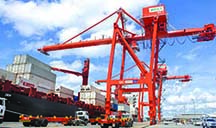
The Senate has approved on third and final reading the bill that will allow foreign ships to dock at multiple Philippine ports if they carry cargoes intended for import or export and are duly cleared by the Bureau of Customs (BOC).
Approved by the Senate on February 23, Senate Bill No. 2486 (An Act Exempting Carriage of Container Vans from the Provision of Section 1009 of Presidential Decree No. 1464, otherwise known as the Tariff and Customs Code of 1978 and for Other Purposes) sponsored by Senator Paolo Benigno Aquino IV amends Section 1009 of the Presidential Decree No. 1464, otherwise known as the Tariff and Customs Code (TCCP) of 1978.
Section 1009 of the TCCP states, “Passengers or articles arriving from abroad upon a foreign vessel may be carried by the same vessel through any port of entry to the port of destination in the Philippines; and passengers departing from the Philippines or articles intended for export may be carried in a foreign vessel through a Philippine port.
“Upon such reasonable condition as he may impose, the Commissioner may clear foreign vessels for any port and authorize the conveyance therein of either articles or passengers brought from abroad upon such vessels; and he may likewise, upon such conditions as he may impose, allow a foreign vessel to take cargo and passengers at any port and convey the same upon such vessel to a foreign port.”
In his sponsorship speech on January 28, Aquino said the exclusive right of domestic carriers to interisland shipping, known as cabotage, “incurs an extra cost for our importers of raw materials and for Philippine exporters of goods.”
The Senate bill does not impinge on the cabotage law. Cabotage is a principle which allows a country to reserve movement of domestic cargo to national carriers to the exclusion of foreign vessels.
Senate President Franklin Drilon said the measure is part of efforts to sustain the country’s economic growth and prepare for the Association of Southeast Asian Nations economic integration slated to start this year.
“Improving our shipping industry and logistical capacity will position the country in the global market and improve the flow of goods and services in the country which will help businesses and ordinary Filipinos alike,” Drilon said.
Aquino said this is “our first step in our effort to further unlock the shipping industry, let it grow and thrive, and make it as efficient as possible as we anticipate more trade, more economic activity, and real inclusive growth for the Filipino people.”
He added that passing the bill answers the call of President Benigno Aquino III and various stakeholders to enhance the country’s maritime transport industry.
Senate Bill No. 2486, according to Aquino, will provide Filipino producers and entrepreneurs the chance to lower production costs by allowing importers and exporters to co-load on foreign ships coming into or going out of the Philippine jurisdiction. This, according to the bill, allows for the decongestion of the Port of Manila.
As an example, Aquino said that an exporter from Cagayan de Oro (CDO) currently needs to pay twice to ship goods to Hong Kong (US$1,120 to ship goods to Manila via a local shipping line, and $144 for the trip from Manila to Hong Kong), while the cost of shipping a twenty-foot equivalent unit (TEU) from Kaoshiung, Taiwan, to CDO only costs $360.
Aquino also noted that the same importer from CDO will also pay twice to ship his cargo: $159 for the trip from Kaoshiung, Taiwan, to Manila using a foreign vessel, and $1,120 for the trip from Manila to CDO.
“Approval of this measure not only saves much needed cash; those who are in the import-export business will also be able to access a cheaper alternative in transporting their goods through co-loading in foreign ships,” Aquino said.
“Ultimately, this leads to lower prices of goods for the Filipino public,” the senator added.
Under the measure, a foreign cargo will be allowed to go directly to Manila, then proceed to CDO, instead of the existing procedure where goods are unloaded in Manila, then transshipped by local carriers to CDO.
“Entrepreneurs who are exporting goods from Subic, Cebu, CDO, and Davao would be able to co-load in one ship before heading out of the country directly in a more efficient and cost-effective manner instead of having to pass by the Manila ports,” Aquino said.
Moreover, allowing foreign ships to go directly to other domestic ports around the country will free up space in the container yards of the Port of Manila, thus, saving time, costs, and energy for exporters and importers sending their raw materials, goods, and products in and out of the country.
The bill, which gathered support from the private sector and government agencies, was approved for second reading January this year and approved at the committee level last year. Its counterpart bill in the Lower House, however, is still pending at the committee level.




